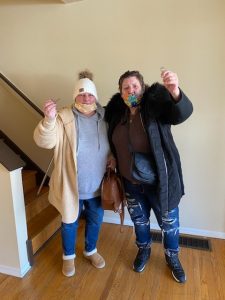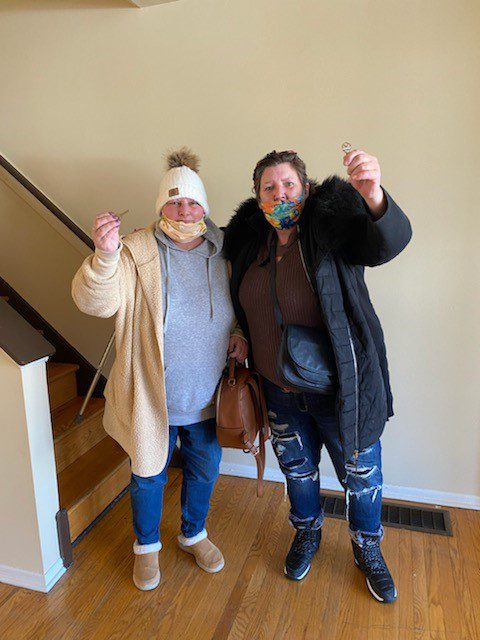
Residents receiving keys to their apartment pose to have their picture taken. Photo courtesy of SELF Inc. Philadelphia
UPDATED Jan. 21, 2022 | Across the country, in urban and rural housing markets, renters contend with lower vacancy rates and rising costs as they compete for fewer and more expensive housing options. Since January 2021, the national median rent has increased by 16 percent, rising over 25 percent in 22 of our largest cities. Housing insecurity and homelessness are on the rise. As of mid-November 2021, 16 percent of all renters had not caught up on rent, and the number of people experiencing unsheltered homelessness continues to rise. For millions of very-low-income households, the map of housing options is bleak.
One underused option is shared housing. Shared housing is when two or more unrelated people live together, split the cost of rent, and share common spaces. Implemented in several communities across the country, the best practice for shared housing is for each person to have their own bedroom in a permanent housing context. Shared housing is a norm across the private housing market, but households exiting homelessness are primarily offered a single-unit option by housing providers. Homelessness is a condition of severed relationships, intersecting with a lack of affordable housing options. Many people who transition from homelessness into single units experience loneliness and social isolation, which is an especially significant issue for older, formerly homeless adults. Deploying shared housing for elderly, single, youth and family households in and at risk of homelessness has opened additional pathways of increased affordability and supportive, live-in community connection.
Every housing/homeless service system has the ability to adopt effective shared housing practices to address affordability and isolation challenges. For three years, the Shared Housing Institute staff has tracked the organizational and environmental practices of successful shared housing programs. Examining and collating themes, strategies, trends, and occurrences of effective shared housing practices led to this summary of critical lessons learned, accumulated from a wide variety of shared housing approaches. As described below, these program reviews show that successful shared housing programs all have leaders committed to driving the expansion of housing options with client-centered services, operationalizing shared housing because it is the only pragmatic way to do this in expensive housing markets.
Shared Housing and Client Choice
The foundational element of all effective shared housing programs is an activated client choice framework (housing-first, client centered approach). Housing First is based on the cost-effective findings that people experiencing homelessness need rapid exits to housing without preconditions of “readiness”, and on the idea that housing is a basic human right. Client choice is the operating principle of Housing First. It means that clients have the power to choose their own housing arrangement, while the role of the housing provider is to help motivate clients to take self-directed steps towards individual goals.
[RELATED: Continuing the Legacy: Keeping Longtime Residents in Their Communities]
Client choice is the bedrock of all effective shared housing practices, including client messaging, housemate pairing, and housing stabilization supports. Though successful shared housing programs vary greatly, they all implement service structures based on housing first, client-centered practices.
Meghann Cotter, executive director of Micah in Fredericksburg, Virginia, has implemented shared housing for over four years. She often notes that “shared housing is not for the faint-hearted,” and there is deep, enduring beauty in the work she and her staff have developed in a challenging housing market where shared housing is the most viable way to place people in affordable units. Micah serves people who are the most vulnerable—long term homeless populations—and supports individuals’ autonomy by discussing deal-breakers and accommodations for each person’s weightiest concerns about choosing housemates. Most successful shared housing programs have a built-in approach whereby potential housemates have a say in discussing ‘deal-breaker’ concerns (i.e., chores, loud music, guest policies) during the housemate match process. Shared housing placements are supported with permanent supportive housing or rapid re-housing assistance.
Exemplifying this approach, Micah caseworkers measure success by asking these two key questions across every step of the housemate match and housing stabilization process: Is what I am doing right now increasing client choice? Does it promote self-determination? Micah continues to evolve and expand shared housing centered on dignity, equality, and commitment to creative empowerment, representing an organization-wide application of the Self Determination Theory described below.
Studies show that promoting client-choice gives clients more agency and responsibility for their own health, finances, social connections, and living space. According to the Self Determination Theory, there are three components to building up an individual’s motivation and ability to achieve self-determined goals. Service structures that promote choice are motivating individual capacity to fulfill the basic human needs of:
- Autonomy: the ability to self-organize and regulate one’s own behavior.
- Competence: the ability to feel confident and effective in work or life efforts.
- Relatedness: the ability to feel cared for by others, to care for others; to feel a sense of belonging.
Self Determination Theory states that when any of these three psychological needs is unsupported, there’s a negative impact on well-being and on the individual’s capacity to achieve their own well-being and goals. The goal for each one of us is to feel we have agency over our own lives, are connected to people we care for, and are living out, in some way, our purpose. Effective shared housing systems promote these primary human needs, housing unhoused people with dignity and respect. How shared living is offered to clients, the way housemates are matched, and how stabilization services are delivered can either promote or thwart a client’s motivation to experience wellness and success. Shared housing is most successful when it fulfills individuals’ needs for competence, connection, and autonomy, and when staff relate to and understand the perspectives of their clients.
Shared Housing In Action
Columbus House in New Haven has been successfully moving people out of homelessness into shared housing for over eight years. It has developed a network of over 600 landlords who trust that they will be supported by Columbus House staff if conflicts arise between shared housing tenants, or if a tenant breaks a lease. Columbus House knows that conflict happens, and provides client-centered case management both to the shared-housing tenant and the landlord. Supporting client competence, Columbus House connects all housed tenants with employment specialists, building a sustaining bridge that continues beyond rapid re-housing assistance. Their client messaging includes offering shared housing as either a short-term or long-term option, with each client committing only to stay for the life of the lease. Shared housing can either be a short-term housing bridge or a long-term place to call home.
[RELATED: As the Pandemic Continues, Officials Look to Long-Term Housing Options with Hotels]

Two residents pose for the camera in the apartment that they share together. Photo courtesy of SELF Inc. Philadelphia
Shared housing leaders from Bay Area Community Services (BACS) in Oakland, California, lead the nation in shared housing placements for vulnerable populations, housing over 2,000 people in shared units with rapid re-housing since 2018. Their return to homelessness rate is below 12 percent, comparable to that of rapid re-housing programs generally. Across its service approach, BACS focuses on doing whatever it takes to uplift the whole person, committed to shared housing grounded in social justice, equity, affordability, and community. Supporting every person’s need for self-determination, BACS staff focuses on client linkages to community supports, such as self-help groups, occupational opportunities, parks, and faith-based activities, as soon as clients settle in shared housing. Every person housed is working on a wellness plan, utilizing SAMHSA’s 8 Dimensions of Wellness framework. BACS staff are extensively trained to use harm reduction, motivational interviewing, and a modified Critical Time Intervention (intensive case management services upfront that decline in frequency over time) for all rapid re-housing households. Their shared-housing philosophy honors the existing healthy relationships of unhoused people, supporting housemate choices made in natural networks already formed in encampments, shelters, and on the streets. BACS CEO Jamie Almanza states: “it’s a beautiful gift that staff experience moving people out of homelessness and isolation—observing the growth of dignity and hope with new friendships and opportunities.”
In Philadelphia, SELF Inc. recently launched a shared housing program for 141 people in collaboration with the Philadelphia Housing Authority, the City’s Department of Behavioral Health and Intellectual disAbility Services and the City’s Office of Homeless Services using a client-centered, recovery-oriented approach, prioritizing the need to address isolation for people with behavioral health issues and promoting autonomy and relatedness. SELF helped keep those with behavioral health issues housed by deploying these specific strategies:
- system-wide culture that supports and encourages compassion, patience and understanding of the challenges faced by many residents,
- intentional meetings between Housing Support Coaches, family members, and Case Managers to ensure that the needs of residents with behavioral health challenges are a priority,
- weekly meetings with funders and behavioral health experts to discuss, come to consensus about and resolve issues faced by residents (those with behavioral health issues and those without), and
- ongoing training of Housing Support Coaches on Motivational Interviewing; diversity, equity, and inclusion; budgeting and conflict resolution.
- funding Certified Peer Specialist(s) who have lived experience and are specifically trained around living with substance use disorders and behavioral/mental health issues, supporting people around harm reduction, recovery and managing their behavioral/mental health.
These strategies have paid off. A recent outside evaluation showed that 91 percent of SELF’s clients placed in shared housing were still housed after six months.
Targeting households that are experiencing homelessness, The Road Home in Salt Lake City, Utah, expanded its shared housing work by sponsoring the development and deployment of a shared housing training for housing authorities. This groundbreaking shared housing training, the first of its kind, focused on building housing authorities staff capacity to support shared housing. The client-focused videos and training materials were based on HUD’s recent notice reminding housing authorities that shared housing is a viable option for all Housing Choice Voucher holders. The Road Home worked with the Shared Housing Institute to hold community forums and trainings that resulted in the development of systemwide goals to increase shared housing placements. The Road Home staff view shared housing as a client-centered approach to rapidly resolve homelessness and are implementing this approach across a variety of housing programs.
Shared Housing Funding Opportunities
Today, we have an unprecedented opportunity to expand shared housing options with expanded federal funding sources, including HUD-funded programs such as ESG, ESG-CV, Housing Choice Vouchers, HOME-TBRA, and all other types of funding for rapid-rehousing. As service systems we have done great things, but we have gone off course in not honoring client choice in rapid housing placements, with far too many available housing options not being explored as viable pathways to exiting homelessness. Shared housing is a way forward, a way to make the impossible possible.
We are urgently called to expand system-wide client-centered shared housing options to promote the fundamental human right of housing, support people in their drive towards self-determination, and enhance the self-respect of clients as they choose among dynamic housing opportunities. Systematically promoting the attainment of available shared housing cultivates in staff the satisfaction of offering people more ways to exit both homelessness and loneliness, and the beauty of being part of collective creative action. City, county and regional homelessness system leaders can join a shared housing learning collaborative to undertake shared housing capacity-building, connect with national program leaders, and commit to do all that it takes to systematically shift toward shared housing as a normative choice for all housing assistance options.
Editor’s Note: An earlier version of this story incorrectly named the Pennsylvania Housing Finance Agency as a partner with SELF Inc.’s work. They are not associated with the project. The partners for the project are the Philadelphia Housing Authority, the City’s Department of Behavioral Health and Intellectual disAbility Services, and the City’s Office of Homeless Services.






Comments